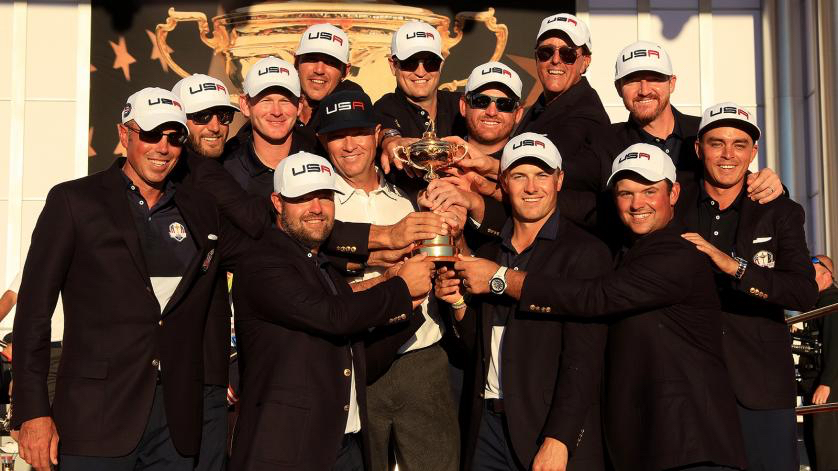USA 17, Europe 11. Those are the bare facts of the 41st Ryder Cup, a bruising and, at times, fiery contest, that ultimately led to a widely predicted victory for the home side.
A third win in only 17 years for Team America served to rekindle a contest that had been in danger of becoming a little too one-sided for the neutral observer, although it won’t feel that way for Darren Clarke and his 12 vanquished men, who suffered Europe’s heaviest defeat in 35 years at Hazeltine National in Minnesota.
USA won three out of the five sessions over the three days, enjoying a 4-0 ‘redwash’ in the opening Friday foursomes, and a 3-1 win in the Saturday four-balls, before concluding with a comprehensive 7½-4½ victory in the Sunday singles.
The one-sided final scoreline was far from a fair reflection of the closeness of some of the individual encounters, although going into the final day with a three-point deficit always looked a tall order for a European team that was short on experience and lacked strength in depth.
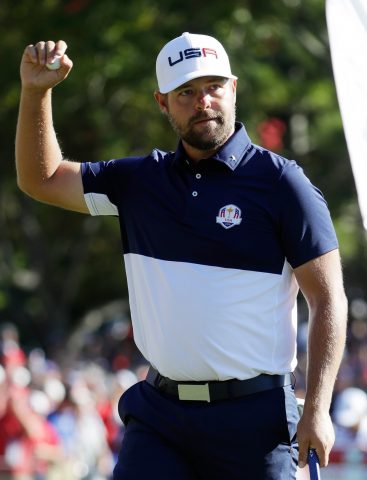
The deciding moment, with the claiming of 14½ points, belonged to US captain Davis Love’s final wildcard pick, Ryan Moore, who came from two down with three to play to see off the challenge of another captain’s pick, Lee Westwood, who ended the week with no points and question marks hanging over his inclusion in the team.
The 43 year old from Worksop was one of four Englishmen to emerge with nothing to show for their efforts, with out-of-form Masters’ champion Danny Willett failing to get on the scoreboard from his three matches, and Andy Sullivan and Matt Fitzpatrick, both of whom only played in two matches, also tasting nothing but defeat. The hero of Medinah, Martin Kaymer, played in four matches but lost three, only getting his putter out of first gear in his singles match against Matt Kuchar, by which time the cup had already been lost.
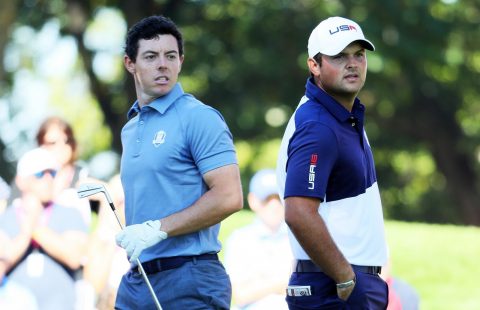
Despite the result, Sunday’s singles once again lived up to its billing as one of the most thrilling sporting spectacles there is to be had, with a succession of spell-binding contests, the quality of which has rarely been witnessed since the matches began back in 1927.
Patrick Reed’s battle with Rory McIlroy, the first match on the course, leapt out from the draw sheet the moment it was confirmed. The pair did not disappoint, most pertinently during a four-hole stretch from the 5th, which saw a combined total of nine under par. Three of those holes were halved in birdies, the 8th especially notable as McIlroy’s 65ft putt for a two was followed in by Reed from half that distance. The sportsmanship which followed was a welcome antidote to some of the more unwelcome interventions of the home crowds, which, at several points during the opening two days, looked in danger of overshadowing the whole competition.
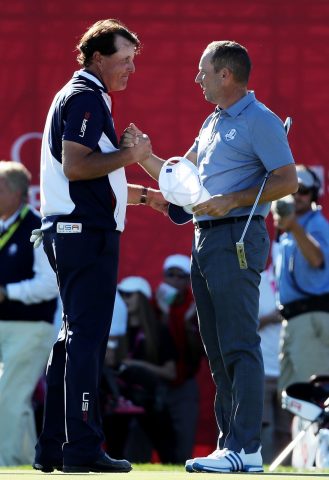
While the opening match set the tone for the day, the match of the week involved Sergio García and Phil Mickelson, who, by the time they took to the 18th tee, had collectively produced 17 birdies. Another two followed on the last, meaning a halved match and respective rounds of 63. It was match play golf of the very highest order and neither player deserved to lose.
“This is a great way to cap the year,” said Mickelson, who was tasting team victory for only the third time in 11 encounters. “This is something that we pulled together to try to accomplish. This is something we’re going to build on as we move forward. Otherwise it’s all for nothing. We have got to take this experience and continue to add to it.”
In the top half of the draw, Henrik Stenson’s professional 3&2 dismissal of an out of sorts Jordan Spieth was expected, but in vain. So, too, was the impressive win by Rafa Cabrera Bello over the US PGA champion Jimmy Walker. In the red corner Rickie Fowler, Moore, Brandt Snedeker, Dustin Johnson, Brooks Koepka and Zach Johnson ensured the USA crashed through, rather than stumbled over, the finishing line.
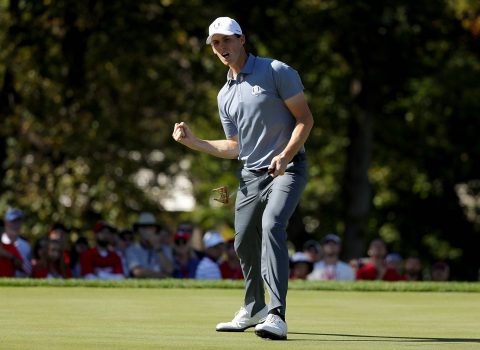
A bright light on an otherwise largely gloomy European horizon was the performance of wildcard selection Thomas Pieters. The big-hitting young Belgian became the first rookie in European Ryder Cup history to deliver four points, three of them in tandem with Rory McIlroy, and the final one the arriving courtesy of a confident 3&2 win over JB Holmes. Hitting towering drives and accurate irons, he was one of the few European player with a hot putter. “I didn’t feel like a rookie,” said Pieters, in his now trademark deadpan delivery. He didn’t play like one either, and more than justified Clarke’s selection.
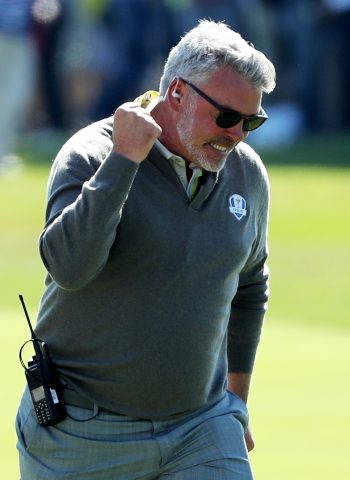
In reality, both captains have little to commend themselves for victory or blame themselves for defeat, despite the presence of task forces and winning blueprints. Europe was always the legitimate underdog against a superior US team, a matter most glaring witnessed on Hazeltine’s super-quick greens, and while Love may have learned a few things following his defeat when in charge at Medinah, his team needed to do little more than play to their form to see off a European team that contained an awkward mix of inexperienced younger talent and older players who were in less assured form. Clarke will no doubt be critiscised in some quarters for his inclusion of Kaymer and Westwood, and one or two pairings decisions over the opening two days, but that’s perhaps for another time.
For now, America should celebrate a victory that has been a long time in the coming and the making. Paris, and 2018, cannot come quickly enough for either side.



